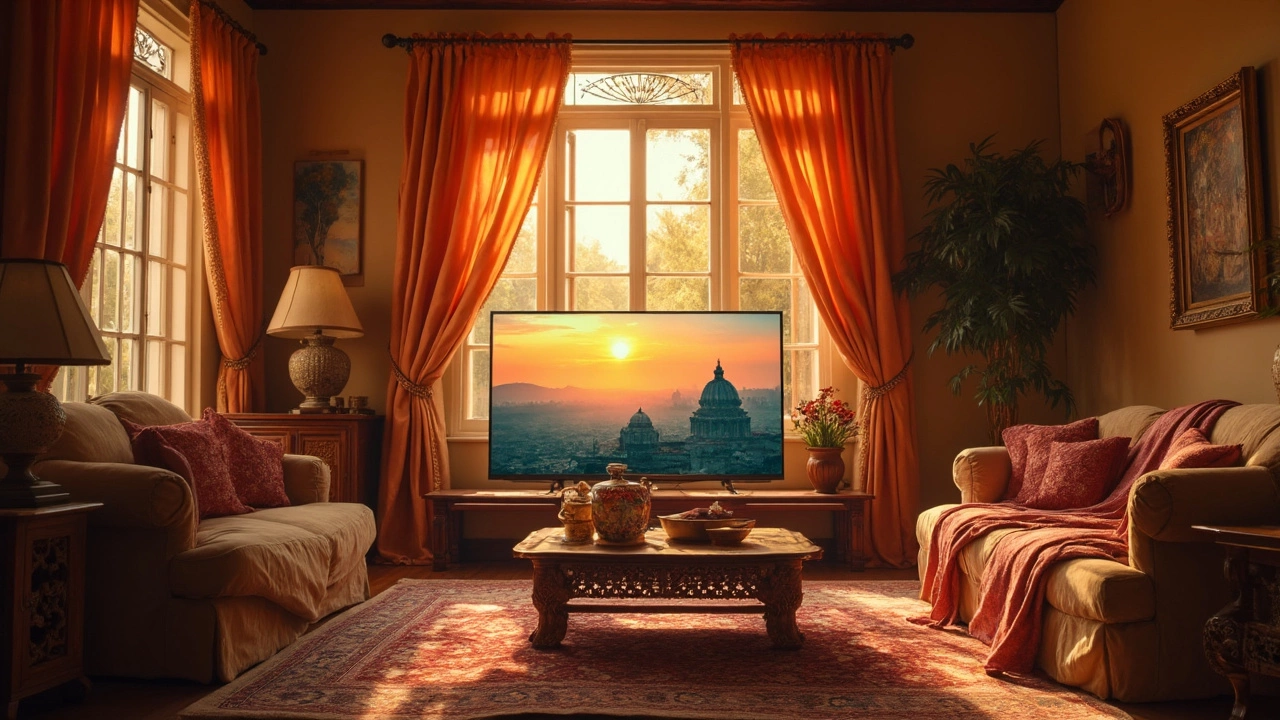
So you're on the hunt for a new 4K TV but stuck between Samsung's QLED and LG's OLED? It's a tough choice, right? Both are leading technologies and promise stellar viewing experiences, but the best one for you depends on what matters most in your viewing habits.
First off, the basics: Samsung's QLED stands for Quantum-dot Light Emitting Diode. They use quantum dots to enhance brightness and color but rely on a backlight, much like traditional LED TVs. LG's OLED, on the other hand, means Organic Light Emitting Diodes. Each pixel in an OLED creates its own light, allowing for true blacks and remarkable contrast.
This means if you're a movie buff who loves deep blacks and vibrant colors, OLED might be your best bet. But, if you watch a lot in brightly lit rooms, QLED's brightness could be a real advantage.
- Understanding QLED and OLED Technologies
- Picture Quality: The Big Difference
- Brightness and Viewing Experience
- Price and Longevity Considerations
- Making the Right Choice for You
Understanding QLED and OLED Technologies
Diving into the world of TVs can feel like a tech maze, especially when acronyms like QLED and OLED get thrown around. But don't worry, they're not as complicated as they sound.
Starting with Samsung's QLED, it stands for Quantum-dot Light Emitting Diode. It basically means the TV screen uses a thin film of quantum dots to enhance color and brightness. These dots are super tiny and help give the TV its signature vivid color and bright display. However, QLED TVs still need a traditional LED backlight, which limits how 'black' your blacks can get because there's usually some minor light leakage.
On the flip side, OLED, by LG, stands for Organic Light Emitting Diode. The key distinction here is that each pixel in an OLED screen emits its own light, so there's no need for a backlight. When an OLED pixel is off, it's entirely off, resulting in pure black and thus, incredible contrast. This tech makes OLEDs perfect for immersing yourself in a movie with stunning visuals.
"OLED technology allows for infinite contrast ratios, giving it an edge in picture quality that really stands out." — TechRadar
Here’s a quick comparison of some crucial aspects:
| Aspect | QLED | OLED |
|---|---|---|
| Backlighting | Yes | No |
| Brightness | Very high | High |
| Contrast | Good | Excellent |
| Color Accuracy | Brilliant | Superb |
In short, if you need a TV that fights off glare from sunlight during the day, you may want a Samsung QLED. But if it's all about movie nights in a dark room, then an LG OLED might be your better bet. Each has its strengths, so understanding your viewing needs will steer you in the right direction.
Picture Quality: The Big Difference
When it comes to picture quality, the debate between Samsung QLED and LG OLED really heats up. Both technologies have their strengths, so let's break them down.
Contrast and Black Levels
LG OLED TVs are famous for their ability to produce perfect black levels. Each pixel can turn off completely, resulting in a true black that's unmatched by any other technology. This means you get incredible contrast and a more cinematic look, especially in dimly lit rooms.
With Samsung QLED, the black levels aren't as deep due to the use of a backlight. However, QLEDs have substantially improved over the years, and the differences might not be noticeable to the average viewer in a well-lit room.
Color Accuracy and Brightness
QLED TVs shine (literally) when it comes to brightness. They can reach much higher brightness levels, making them perfect for daytime TV watching or bright environments. The quantum dots help maintain color accuracy even at these high brightness levels.
OLED, while not as bright, excels in color accuracy as well. The individual pixel lighting in OLED provides a wider color gamut, leading to vibrant and lifelike hues. If you're watching a nature documentary, the green leaves or blue oceans on an OLED screen can look breathtakingly real.
Viewing Angles
This is where OLED has the upper hand again. With OLED, you get consistent picture quality from almost any angle. If your living room has seats at the sides, viewers won't see a distortion in color or brightness.
QLEDs have improved viewing angles compared to traditional LEDs, but there's still some loss in color and contrast when viewed from extreme sides.
Resolution and Detail
Both QLED and OLED TVs offer 4K resolution, and many models are stepping into 8K. In terms of detail, they both do a fantastic job. However, the extra contrast in OLED might make some scenes pop more, lending a sharper appearance.
In summary, if your priority is excellent black levels and wide viewing angles, LG OLED is tough to beat. But for those prioritizing brightness and vibrant colors in any room's lighting condition, Samsung QLED could be the way to go.

Brightness and Viewing Experience
When it comes to TVs, especially 4K models like the Samsung QLED and LG OLED, brightness and the overall viewing experience are big deals. If you've ever watched a movie in a sunlit room, you know how frustrating screen glare can be.
Samsung QLED TVs tend to shine here—literally. With higher peak brightness, QLEDs are fantastic for brightly lit rooms. More lumens mean they can combat glare more effectively, making them a solid choice if you do most of your viewing in the daytime or under bright room lights.
Advantages of QLED in Bright Spaces
- Brighter screens make them a great option for well-lit rooms.
- High peak brightness enhances HDR content, making colors pop even more.
But let's not count LG OLED out. One of their standout features is their ability to offer perfect blacks. Since each pixel emits its own light, you can get amazing contrast. This is perfect for those dark, atmospheric movie nights. You get a real cinematic feel without needing a pitch-black room.
Strengths of OLED for Cinematic Viewing
- True blacks give unmatched contrast levels.
- Wide viewing angles mean the picture stays perfect no matter where you sit.
A quick note on stats: according to some past tech reviews, QLEDs can push over 1,500 nits of peak brightness, while OLEDs hover around 800-1000 nits. Clearly, each has its turf.
Think about your living space and habits. Do you often have friends over for game day during the afternoon? QLED might be your best pick. Do you love a good moody drama late at night? Then OLED could be your thing. Remember, with TVs, context is key!
Price and Longevity Considerations
Deciding between a Samsung QLED and an LG OLED often comes down to budget and how long you want your investment to last. Let's break down the facts so you can figure out what works best for your wallet and your living room.
Price Tags: Breaking the Bank or Bargain?
OLED TVs, while known for their amazing picture quality, tend to have a heftier price tag. This is mainly because the technology behind OLED is more expensive to produce. You're paying for those true blacks and perfect colors.
On the other hand, QLEDs offer a more wallet-friendly price point. Samsung has worked hard to keep costs down while still offering excellent performance. Therefore, if you’re looking for more affordable 4K televisions without sacrificing too much on picture quality, QLED could be the way to go.
Longevity: Lighting the Long-Term Way
Another major consideration is how these TVs age. OLEDs are susceptible to burn-in; this phenomenon happens when static images are displayed for a long time, but modern models have improved features to minimize this risk. However, it's something to keep in mind if you're a gamer or you leave news channels on all day.
QLED, with its LED backlight, isn’t prone to burn-in, usually lasting longer with consistent quality over time. Plus, their typically higher brightness levels won’t diminish as fast as OLED screens.
Here's a quick look at how they stack up:
| Feature | QLED | OLED |
|---|---|---|
| Average Price | Less expensive | More expensive |
| Burn-in Risk | Low | Moderate |
| Brightness Longevity | Consistent over time | Potential decrease |
Your choice might hinge on whether you plan to keep the TV for several years or if you’re the type to upgrade regularly. Remember, paying a lot upfront for an OLED might mean more savings over the long haul if performance truly matters to you. Meanwhile, if durability and maintenance-free service are your top priorities, QLEDs hold up well over time.

Making the Right Choice for You
Let's break it down to help you choose between Samsung QLED and LG OLED. What should you really care about? Well, it's all about where you're watching and what you're watching. Consider your living room's lighting. If it's bright like a summer's noon, those QLEDs might shine brighter, literally. They handle glare like a pro. But, if you’re the movie marathon type who loves pitch-black scenes, OLED steals the show.
Which One Fits Your Lifestyle?
If gaming is your gig, you'll love that LG OLED TVs often have lower input lag, giving you the edge in fast-action games. But if you're all about those beautiful landscapes in nature docs, Samsung QLED's vibrant colors and brightness won't let you down.
Budget and Size Considerations
Price can also be a clincher. Generally, QLED sets might be easier on the wallet, especially in bigger screen sizes. However, the gap isn't as wide as it once was. Remember, technology is always shifting, so checking the latest deals is crucial. Size-wise, measure your space. A massive TV in a small room? Not cool.
- Brightness Matters: For sunlit rooms, the extra brightness of QLED wins.
- True Blacks: OLED delivers unbeatable contrast for dark scenes.
- Price: QLED can be the cheaper option, especially as you go bigger.
- Gaming: OLED often benefits fast-paced gaming due to lower input lag.
If you're still on the fence, maybe it's worth a trip to the store to see for yourself. Often, your eyes can make the best decision. Seeing the vivid displays side-by-side can be the final nudge you need to choose your dream TV.